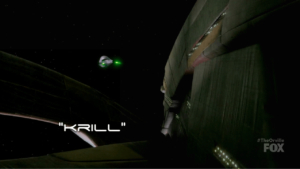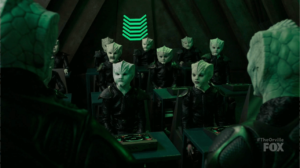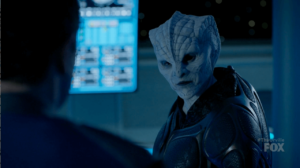 This is the episode that brought me back to The Orvile after what I saw as a shockingly dull, unfunny and vacuous first episode made it the lowest of priorities for me. Here I saw what Seth MacFarlane was really up to, not issuing a Galaxy Quest like parody of Star Trek, but reviving, as completely as legally possible, Star Trek: The Next Generation. I even wonder if the comedy was a requirement of the network, since it’s just expected with him. MacFarlane’s resurrection came with a fair number of Next Generation’s creative crew behind the scenes, and gave them some gifts, much of what they had to fight for in their showsake’s time: enough of a budget to write any story they like, and even show off the beauty of the universe sometimes; a galaxy populated with flawed people, rather than perfect little evolvelings; the stories not shoehorned into A plot/B plot structures; and characters who are people first, positions and representations second, which is how MacFarlane chooses to employ the humor.
This is the episode that brought me back to The Orvile after what I saw as a shockingly dull, unfunny and vacuous first episode made it the lowest of priorities for me. Here I saw what Seth MacFarlane was really up to, not issuing a Galaxy Quest like parody of Star Trek, but reviving, as completely as legally possible, Star Trek: The Next Generation. I even wonder if the comedy was a requirement of the network, since it’s just expected with him. MacFarlane’s resurrection came with a fair number of Next Generation’s creative crew behind the scenes, and gave them some gifts, much of what they had to fight for in their showsake’s time: enough of a budget to write any story they like, and even show off the beauty of the universe sometimes; a galaxy populated with flawed people, rather than perfect little evolvelings; the stories not shoehorned into A plot/B plot structures; and characters who are people first, positions and representations second, which is how MacFarlane chooses to employ the humor.
The show also goes beyond checklist point-making. In this episode, the deaths of the villains are horrible, despite the raucous music implying victory.

Their faces catch fire and char away as they yell in agony, then drop like clumps. It’s a detail of victory by death that it is usually messy, and rarely not torturous. In this case, the enemy is burned alive, and on this point, The Orville is not afraid of details.
Fighting your enemies
In this episode, our heroes, in disguise on an enemy ship, hoping to gain more knowledge of their aggressors in order to better communicate with them, find themselves arguing about diverting their mission from an in-and-out spy operation, to killing those enemies on board en masse, because it is the only available way to stop the release of a bomb intended to wipe out the planet Rana 3’s entire population.
“We came here to try to find a way to make peace, and now we’re talking about killing everybody on board.”
We may have nothing against our enemies, or even not accept the concept of enemy—can’t we all just get along?—but the fact that we do not hate those who hate us does not mean they don’t actually hate us, and won’t take action on that hatred. We may choose to live and let live, or even pursue peace with them, but there can come a time when they cross a line. When an enemy is determined, able, and proceeding to act destructively, then you may have to take the shot, possibly even the first one.
I understand resistance to this idea. One is right to want proof before engaging in destruction, and actions are often fair proof of a position just as words are the proof of thoughts. In any situation, a flood of thoughts may hit the mind, more a set of options than what one actually thinks. We speak the ones we see as right. Words are the thoughts we commit to:
“…out of the overflow of the heart, the mouth speaks.”
—Luke 6:45
Actions are the ideas we have committed to. We could almost paraphrase, “Out of the overflow of his philosophies, the man acts.”
But it is incorrect to await the final result of a state of affairs which are designed to lead only one way, as if we must see the conclusion in order to accept its inevitability. You don’t have to see before you believe, and you do not wait for a first strike when it will destroy you.
It’s a tricky issue, perhaps especially for Christians, for whom ‘turn the other cheek’ is often one of the earliest things we learn. Yet, as His earthly ministry was coming to its conclusion, Jesus told those who would carry the Gospel forward, “If you don’t have a sword, sell your cloak and buy one.” (Luke 22:36) He endorsed their right to defend themselves against the threats He knew would come. God admonished his people to “Defend the oppressed” (Isaiah 1:17), and to “rescue the weak and the needy; deliver them from the hand of the wicked.” (Psalm 82:4) In the New Testament we are warned, “…if you do wrong, be afraid, for rulers do not bear the sword for no reason. They are God’s servants, agents of wrath to bring punishment on the wrongdoer.” (Romans 13:1) These things cannot be done without confronting the attacker, usually with force.
Turning the other cheek tells us not to retaliate when offended; it does not forbid self-defense, nor the defense of others. Self-defense is Christian. Unsurprisingly, it is also woven into the fabric of humanity and logic as a plainly reasonable thing.
The importance of getting into the weeds
 Mercer and Malloy eventually learn that in vanquishing their genocide-minded foes, they will also kill children. Like some of the best ethics-focused episodes of Star Trek (TNG’s “The Measure of a Man” and DS9’s “Duet” leap to my mind), “Krill” does a better than fair job of letting the many ethical angles come into play.
Mercer and Malloy eventually learn that in vanquishing their genocide-minded foes, they will also kill children. Like some of the best ethics-focused episodes of Star Trek (TNG’s “The Measure of a Man” and DS9’s “Duet” leap to my mind), “Krill” does a better than fair job of letting the many ethical angles come into play.
Ed: ”If we destroy this ship with those children on board, then Teleya is right. We have no souls.”
Gordon: ”There are kids on Rana 3.”
If they simply act, kids they have met will die. If they simply don’t, kids they have not met will die. Children will die, as long as they decide simplistically.
One of the least helpful approaches to finding the truth of a matter is to “stay out of the weeds.” It is a plea to ignore relevant details and focus on the big picture only, but that is not how we solve issues with integrity. The truth is rarely simple, and if the devil is in the details, then that is where we must go to ferret him out and expel him—metaphorically speaking. The children, who have no apparent violent intent, are the discovered details. If you ignore the details, then they must die for their parents’ actions. Not nice. Specifics matter. Nuance isn’t always spin. This episode gets that.
But the episode applies that approach selectively.
‘Religion’
“Generally, when a civilization becomes more technologically advanced, their adherence to religion declines, but the Krill are an exception. They’ve clung fiercely to their faith, even into the age of interstellar travel.”
—Admiral Ozawa
‘Clung’, ‘fiercely’, ‘even’. It never fails to surprise me when people blindly assume that as people learn how to make more things, their reasons to accept the existence of the creator would customarily ebb, and must be emotional, or irrational. As some of these Trektember pieces point out, like official Star Trek, MacFarlane’s Star Trek occasionally has points to make about religion.
Unfortunately, they’re equally pedestrian, something especially noticeable when contrasted with the sophisticated illustration of issues surrounding enmity which are present in this very same episode. “God created plants and animals solely for the use of man,” is given as a summation of a long outmoded, religious, probably Christian, viewpoint: that of ’divine right’. I guess it could be Islam too. Looking at the Krill as broadly as The Orville looks at religion, they are closer to violent Muslims than to Christians (even the violent ones); but the Ankana isn’t called the “Krill Koran,” it’s called the “Krill Bible.” MacFarlane further places the target on Christians when his character stumbles his way through what he hopes will establish his bona fides as a waver of the Krills’ religious flag:
“For me, man, whenever I’m having a bad day all I gotta do is crack that baby open to any page and it’s just– just like a backrub for the brain, man. It just… hits the spot.”
What he’s cutely parroting more resembles an approach to the Bible found in peculiar corners of American Christian culture (albeit those with their own TV channels) than in anything commonly associated with adherents to Islam. It’s a funny line, and comedy often capitalizes on the freedom to be broad, but where there is evidence of a sharpness of aspect, it is always disappointing to see it conveniently dulled when pointed in certain directions.
For example, “Krill” wants to have a message about how we create enemies out of potential friends, even how that may be inevitable sometimes, but it subverts that with the facts of the story, and how its leads react to those facts.
After our heroes spare the children, while killing all others on the ship and saving a hundred thousand people from an unmotivated bombing, Captain Mercer talks with a Krill survivor named Teleya. She asks why he even bothered to save the Krill children. He gives a properly impassioned declaration of their inculpability, and ends saying, “They’re not my enemies.”
Teleya replies, ”After what they saw you do today, they will be,” and we hold on Ed’s ashen expression as he realizes the weight of her words. Cut to the ship and fade to black. It’s a powerful ending, and I’m glad MacFarlane let it have its full impact. I’m also glad God gave me the brains to sort through some of its implications.
By the measure you use, it will be measured to you
The episode makes Teleya a sympathetic figure, likable, approachable and interested; but in dialogue with a student, she says, “Judge a stranger not by his sheath, but by his sword.” Her sheath is her interpersonal kindness, as well as being a teacher of children and a bereaved sister. Her sword (and because she agrees with it, it is hers) is wiping out people she has never met, in mass numbers. This is a person who says, when her peoples’ target is described as defenseless farmers, “An ideal site, yes!” She is also training children, including the open-minded Koja, to not think about their cultural bromides, but to accept them uncritically. This is not the go-to for unchallengeable morality perspectives.
 She also demonstrates the weaknesses of thinking carelessly. She tells our boys that her faith was confirmed when her brother’s ship was destroyed, substantiating the notion that those who destroyed it had no souls. Presumably those with souls do nothing when being attacked to the point of destruction, but she did not apply this thinking to her own kind. And when Ed asks her, “Our mission was in the interest of peace, but your crew was going to murder over 100,000 people, what the Hell else could I have done?” she simply doesn’t answer. The show does not underline this; it almost seems to not notice. It needs her final line to be potent, so she cannot be undermined, but she is demonstrably an unreliable dispenser of perspectives to accept.
She also demonstrates the weaknesses of thinking carelessly. She tells our boys that her faith was confirmed when her brother’s ship was destroyed, substantiating the notion that those who destroyed it had no souls. Presumably those with souls do nothing when being attacked to the point of destruction, but she did not apply this thinking to her own kind. And when Ed asks her, “Our mission was in the interest of peace, but your crew was going to murder over 100,000 people, what the Hell else could I have done?” she simply doesn’t answer. The show does not underline this; it almost seems to not notice. It needs her final line to be potent, so she cannot be undermined, but she is demonstrably an unreliable dispenser of perspectives to accept.
Will those children be devastated by their parents’ deaths? That’s likely. Will they remain angry and hostile toward humans? Maybe. Possibly they will become embarrassed at their parents’ intents. In the late-60’s and 70’s, a cinematic movement arose in Germany called New German Cinema. Like many film movements that arose near that time, it was partially a turn from the style of film making that seemed stagnant to the youth of the country, but it was also noted for generating movies which accused, and often condemned, Germany for having embraced Naziism. Their parents embarrassed them. These weren’t angry, allies-hating film makers, but people ashamed of the way their own people had turned from those objective moral perspectives which need no group’s affirmation to have their truths recognized.
We are not honor bound to accept the perspectives of the author. We get to see through the propaganda, even when it’s coming from our side.
“…don’t ask me what I like or what I approve of. Ask me what I think is true. The truth isn’t always nice. It isn’t always likable. But I believe you’ve got to cling to it.”
—Harry Blamires, The Christian Mind
• • •
Trektember is an annual series about Star Trek; this year, we’re examining the first seasons of Star Trek: Discovery and The Orville. For more information on this series, click here; or, to read every article from the beginning, click here!



2 comments